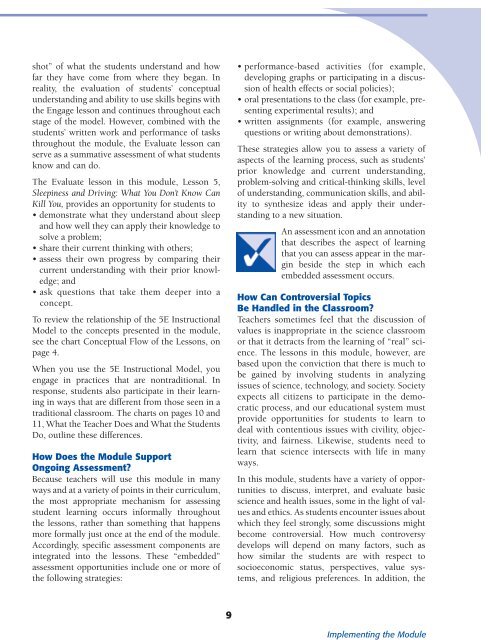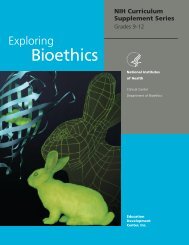Biological - NIH Office of Science Education - National Institutes of ...
Biological - NIH Office of Science Education - National Institutes of ...
Biological - NIH Office of Science Education - National Institutes of ...
You also want an ePaper? Increase the reach of your titles
YUMPU automatically turns print PDFs into web optimized ePapers that Google loves.
shot” <strong>of</strong> what the students understand and how<br />
far they have come from where they began. In<br />
reality, the evaluation <strong>of</strong> students’ conceptual<br />
understanding and ability to use skills begins with<br />
the Engage lesson and continues throughout each<br />
stage <strong>of</strong> the model. However, combined with the<br />
students’ written work and performance <strong>of</strong> tasks<br />
throughout the module, the Evaluate lesson can<br />
serve as a summative assessment <strong>of</strong> what students<br />
know and can do.<br />
The Evaluate lesson in this module, Lesson 5,<br />
Sleepiness and Driving: What You Don’t Know Can<br />
Kill You, provides an opportunity for students to<br />
• demonstrate what they understand about sleep<br />
and how well they can apply their knowledge to<br />
solve a problem;<br />
• share their current thinking with others;<br />
• assess their own progress by comparing their<br />
current understanding with their prior knowledge;<br />
and<br />
• ask questions that take them deeper into a<br />
concept.<br />
To review the relationship <strong>of</strong> the 5E Instructional<br />
Model to the concepts presented in the module,<br />
see the chart Conceptual Flow <strong>of</strong> the Lessons, on<br />
page 4.<br />
When you use the 5E Instructional Model, you<br />
engage in practices that are nontraditional. In<br />
response, students also participate in their learning<br />
in ways that are different from those seen in a<br />
traditional classroom. The charts on pages 10 and<br />
11, What the Teacher Does and What the Students<br />
Do, outline these differences.<br />
How Does the Module Support<br />
Ongoing Assessment?<br />
Because teachers will use this module in many<br />
ways and at a variety <strong>of</strong> points in their curriculum,<br />
the most appropriate mechanism for assessing<br />
student learning occurs informally throughout<br />
the lessons, rather than something that happens<br />
more formally just once at the end <strong>of</strong> the module.<br />
Accordingly, specific assessment components are<br />
integrated into the lessons. These “embedded”<br />
assessment opportunities include one or more <strong>of</strong><br />
the following strategies:<br />
• performance-based activities (for example,<br />
developing graphs or participating in a discussion<br />
<strong>of</strong> health effects or social policies);<br />
• oral presentations to the class (for example, presenting<br />
experimental results); and<br />
• written assignments (for example, answering<br />
questions or writing about demonstrations).<br />
These strategies allow you to assess a variety <strong>of</strong><br />
aspects <strong>of</strong> the learning process, such as students’<br />
prior knowledge and current understanding,<br />
problem-solving and critical-thinking skills, level<br />
<strong>of</strong> understanding, communication skills, and ability<br />
to synthesize ideas and apply their understanding<br />
to a new situation.<br />
An assessment icon and an annotation<br />
that describes the aspect <strong>of</strong> learning<br />
that you can assess appear in the margin<br />
beside the step in which each<br />
embedded assessment occurs.<br />
How Can Controversial Topics<br />
Be Handled in the Classroom?<br />
Teachers sometimes feel that the discussion <strong>of</strong><br />
values is inappropriate in the science classroom<br />
or that it detracts from the learning <strong>of</strong> “real” science.<br />
The lessons in this module, however, are<br />
based upon the conviction that there is much to<br />
be gained by involving students in analyzing<br />
issues <strong>of</strong> science, technology, and society. Society<br />
expects all citizens to participate in the democratic<br />
process, and our educational system must<br />
provide opportunities for students to learn to<br />
deal with contentious issues with civility, objectivity,<br />
and fairness. Likewise, students need to<br />
learn that science intersects with life in many<br />
ways.<br />
In this module, students have a variety <strong>of</strong> opportunities<br />
to discuss, interpret, and evaluate basic<br />
science and health issues, some in the light <strong>of</strong> values<br />
and ethics. As students encounter issues about<br />
which they feel strongly, some discussions might<br />
become controversial. How much controversy<br />
develops will depend on many factors, such as<br />
how similar the students are with respect to<br />
socioeconomic status, perspectives, value systems,<br />
and religious preferences. In addition, the<br />
9<br />
Implementing the Module

















